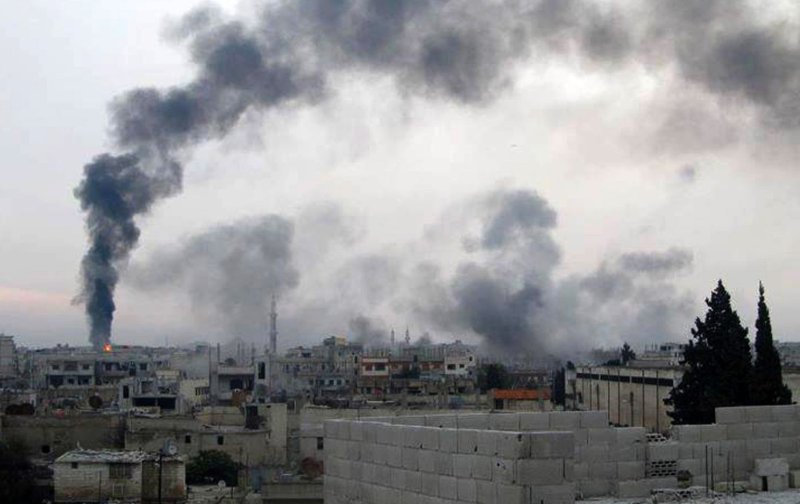1 of 4 | Smoke is seen rising from Bab Amro near Homs as government forces continue to bomb the rebel areas in Syria on February 15, 2012. Syria's President Bashar al-Assad has called for referendum on a new constitution that would effectively end nearly five decades of single party rule, it was announced today. UPI |
License Photo
BEIRUT, Lebanon, Feb. 16 (UPI) -- Israel and Western powers say they are becoming nervous about Syria's significant arsenal of chemical weapons, primarily the possibility that they could fall into the hands of militant groups such as al-Qaida, which seems to be elbowing its way into the Syrian conflict.
There is, of course, the possibility that embattled President Bashar al-Assad, fighting to save his dynastic regime, might decide to use chemical weapons against those struggling to bring about his downfall.
No one knows if he or his hard-line generals would resort to such a horrific move if they felt they were facing defeat. But, given the regime's ruthless crackdown on its opponents since the uprising erupted March 15, 2011, with some 6,000 people killed, using chemical weapons against his enemies, or even against foreign military intervention, cannot be ruled out.
"It's not unlikely that in a developing civil war in Syria, or in the event of Assad's regime collapsing, chemical weapons will fall into the wrong hands," warned retired Israeli Gen. Michael Herzog.
"In an extreme scenario an irresponsible actor might even use such weapons, especially against Israel."
The only known use of chemical weapons in recent decades has been in the Middle East.
Egyptian leader Gamal Abdel Nasser used mustard gas against royalist forces in the 1963-70 Yemen civil war. The first attack by the Egyptians, who backed the republicans, was an airstrike using mustard gas against the village of Kawma June 8, 1963, killing seven people.
Saddam Hussein used mustard gas and the nerve agents sarin, tabun and VX against rebellious Kurds in the 1980s, most notoriously in the northeastern town of Halabja in Iraqi Kurdistan March 16, 1988. That massacre during the closing days of the Iran-Iraq war killed 3,200-5,000 people. Thousands more died later.
It was the most devastating chemical attack against civilians in history.
During that Persian Gulf conflict, both sides repeatedly used poison gas against each other's military forces.
"If Syria collapses into chaos over the next few weeks and months, or the army splits between Assad's fellow Alawites and the majority Sunnis, a key questions will be the fate of these chemical weapons and their delivery systems," observed former CIA officer Bruce Riedel.
"Terrorist groups, such as Assad's friends Hezbollah and Hamas, would love to get sarin warheads," said Riedel, who was a counter-terrorism specialist and analyst during a 29-year career with the CIA until he retired in 2006. "Whether they could maintain and use them is another question."
On Sunday, Al-Qaida leader Ayman al-Zawahiri called on Sunni Salafists in Iraq, Lebanon, Jordan and Turkey to join their coreligionists in Syria against the regime led by minority Alawites.
On Monday, a defecting Syrian officer, Capt. Abdel-Salaam Ahmed Abdul Razek, claimed Assad's forces, supervised by Iranians, used sarin, a nerve agent 500 times more toxic than mustard gas, against rebel forces in Homs.
There has been no independent verification of that. But Syria began stockpiling chemical weapons, including sarin and blister agents like mustard gas and phosgene, first used in World War I, in the 1970s.
In 1982, after Syria's defeat during Israel's 1982 invasion of Lebanon, Assad's late father, Hafez Assad, launched a major Syrian chemical weapons program to provide a deterrent against the Jewish state.
Concerns about Syria's chemical weapons were heightened Jan. 11, when customs officials in Turkey, Syria's northern neighbor and a leading adversary of Assad's regime, reported seizing four Iranian-registered trucks that contained "military materials." These included components for chemical weapons such as 66 tons of sodium sulfate.
Similar concerns arose during the Libyan uprising against Moammar Gadhafi in 2011. Western governments feared Gadhafi, who was killed in September, might use them against his enemies.
As far as is known, he didn't and his chemical arsenal has largely been secured since his demise.
But it could be a different story in Syria. The danger isn't just whether Assad uses them but whether opposition forces or terrorist groups overrun the regime's chemical weapon depots, some in rebellion flash points.
These are reported to be in at least four provincial production facilities in al-Safira, Hama, Homs and Latakia, munitions storage depots at Khan Abu Shamat and Furqlus, and a chemical weapons research site near Damascus.
Syria reportedly has hundreds of tons of chemical weapons, plus chemical warheads for its medium-range Soviet-built Scud-B and C ballistic missiles, as well as chemical weapons bombs and artillery shells.





